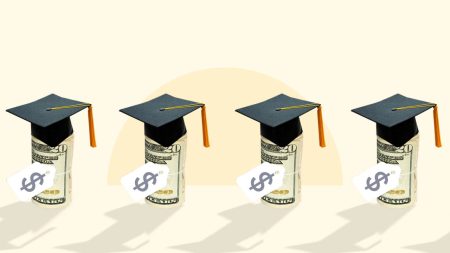American consumers are worried about the economy. In fact, through the rest of 2025, American consumers’ top three financial concerns are inflation, a recession and interest rates. That’s according to TransUnion’s mid-year Consumer Pulse Study, and it’s a sign of what’s at stake.
The report went on to find that uncertainty about tariffs may be influencing consumer credit decisions: More than one in three (37 percent) of consumers who were ‘very concerned’ about tariffs say they plan to borrow or refinance debt next year.
If you’re considering a personal loan, Bankrate spoke to industry experts and answers your most pressing questions.
Should economic turmoil affect your personal loan decision-making?
There’s a deluge of economic news these days, and it’s not exactly settling. Talk of tariffs, stubborn inflation numbers and the risk of a forthcoming recession seem to be mainstays in the news cycle. The advice from experts is to take it all in stride.
“It’s almost impossible to know with certainty what’s going to happen in the future,” says Upstart chief marketing officer Chantal Rapport. “So, if you have a need for a personal loan, for a home equity loan, if you need to save money on your car loan, you should check your options.
“[Prequalifying] doesn’t impact your credit score,” Rapport adds. “It doesn’t cost you anything to know your options. And if the rate and terms look good for you, they fit your monthly budget, they save you money, then you should do that. And if they don’t, then you should wait until a time that they do.”
When there is uncertainty in the market, this often results in consumers seeking new credit to ensure they are prepared for any future financial hurdles. While it’s not clear just how much of an impact tariffs will have on consumer wallets, it is clear that those consumers who are most concerned about them are more likely to be preparing for the future through myriad credit options.
— Charlie Wise, senior vice president and head of global research and consulting at TransUnion
Is anything in the Big, Beautiful Bill going to affect personal loans?
Congress passed much of the Trump Administration’s legislative agenda in a single megabill by the president’s Independence Day deadline. Now, it’s time to sort through the fallout.
While nothing in the new law’s text directly addresses personal loan borrowers — at least not as directly as it addresses auto loan applicants — there are some indirect impacts, including:
- Will the bill’s consumer-friendly effects — lower taxes, including on tips, and a larger child tax credit, to name a couple of examples — reduce your need for a personal loan?
- Or will its less-friendly impacts — such as losing Medicaid coverage or SNAP benefits — increase your demand for loans?
The answer depends entirely on your unique financial situation, your purpose for borrowing and where the economy goes from here.
Does the national debt have any impact on my debt?
Detractors of the Big, Beautiful Bill pointed to its cost, potentially adding up more than $3 trillion to the already swollen national deficit, according to the Congressional Budget Office.
Unfortunately, the more the U.S. goes into the red, the more likely you’ll (continue to) face higher personal loan interest rates. That’s because a higher national debt typically makes for diminished yields on U.S. Treasury bonds, which can lead lenders to seek high returns on their investments in the form of higher interest rates. And while personal loan APRs don’t directly rise or fall according to these yields, they’re undoubtedly influenced. Lenders are paying attention.
Put another way: Adding to the national debt isn’t exactly a leading indicator of falling personal loan rates. But if you have existing personal loan debt with a fixed interest rate, rising or falling rates won’t affect your debt at all.
What’s a good interest rate on a personal loan in this environment?
In short, a lower rate than you’re currently paying on your debt is a rate worth considering. That was the message from Upstart’s Rapport, and it’s wise to take heed. Every percentage point you can decrease your APR (without extending your repayment term) is money you don’t have to pay in interest.
As for what competitive rates look like, rely on Bankrate’s personal loan APRs forecast to stay up to date. You can also keep an eye on the best personal loan lenders’ rates — just keep in mind that the lowest figure they advertise is strictly for the most creditworthy applicants, and often requires a repayment term of three years or less.
Here’s a look at the average personal loan rate over the past few years:
| Average interest rate on a two-year personal loan | |
| 2025 (Q1) | 11.66% |
| 2024 | 12.27% |
| 2023 | 11.87% |
| 2022 | 9.87% |
| 2021 | 9.38% |
| 2020 | 9.51% |
| Source: Federal Reserve |
Which banks have the lowest interest rates on personal loans?
You won’t know until you shop around. Browse rates with banks, credit unions, online companies and marketplaces like Bankrate, which offers multiple quotes from partner lenders. Then you’ll be sure to get the lowest possible rate for your situation.
If you don’t have the best credit, remember to keep an eye on the ceiling of lenders’ APRs, not just the basement. You’ll notice that many reputable online lenders cap rates at credit card-like figures of 35.99 percent — while federal credit unions are mandated to limit rates to 18 percent. That fact alone means that credit unions could offer the best loan for your scenario.
How hard is it to get a personal loan right now?
When there’s uncertainty in the economy, lenders may tighten their underwriting criteria to minimize their risk. They’re preparing their own books for a potential downturn.
While that’s generally true, we haven’t seen personal loan lenders specifically adjust their eligibility criteria in recent months. So, if you’re a strong candidate for a loan — perhaps you have stable credit and income, or a cosigner or co-borrower who does — you’ll still find welcoming lenders and competitive rates and terms. But it also means that if your personal loan application is weaker and you’re a borderline candidate for loan approval, you might find fewer lenders who’d offer their stamp of approval.
But again, in personal lending, there’s little evidence to suggest loans are more out of reach than they’d be in any other market environment. For instance, while you can get a personal loan without a job, it’s generally more difficult to accomplish than if you have steady employment — that’s true regardless of how many question marks exist in the broader economy.
What are the benefits of obtaining a personal loan in this economy?
The most common reason to borrow a personal loan is to consolidate higher-interest debt for a more affordable monthly payment or, ideally, a lower interest rate. That’s true in any economy, but particularly in this one. If you’re struggling to make ends meet — or worried that the return of inflation or a potential recession could cause that to happen — organizing your debt within your budget could be especially wise.
Another key benefit of personal loan borrowing in questionable times is the opportunity to invest in — and insulate — yourself, particularly if your income might not be as dependable as you’d like.
What are your next steps?
It may not be satisfying to hear, but sometimes the best advice is boring: While the economy may influence your need for a personal loan, your decision to borrow should be based on your personal financial situation, not the news cycle.
If borrowing can help you accelerate or manage your debt repayment, it’s worth considering. It might also be a helpful way to develop a recession-proof income stream. To continue your journey, learn more about types of personal loans. You might also investigate our experts’ recommended saving strategies to lessen your need for borrowing, or to avoid it altogether.
Why we ask for feedback
Your feedback helps us improve our content and services. It takes less than a minute to
complete.
Your responses are anonymous and will only be used for improving our website.
Help us improve our content
Read the full article here












